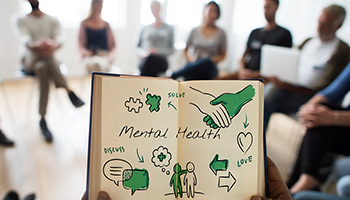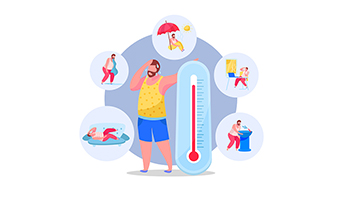Tips to Improve Mental Health
Feb 24, 2022
Physical health is the foundation for your well-being, and if you are suffering from common mental illnesses like depression or anxiety, you may notice that your physical health declines too. That's why it's important to keep up with healthy habits and take care of your physical and mental health as much as possible.
There are various reasons why we might find ourselves experiencing a mental health problem. When you're feeling stressed or anxious, it can be hard to remember how to support yourself in a way that will make you feel better. Sometimes a little help from others is really all it takes to get us back on track, but sometimes we need to focus on taking care of ourselves.
Whether you're suffering from depression, anxiety, or another mental health condition, there are plenty of things you can do on your own to improve your mood and outlook. These tips aren't meant as a treatment for mental health conditions. But, if you practice them regularly, they may help reduce your stress levels and boost your overall sense of well-being:
Eating Well
What we eat can have a huge impact on our mental health, so it's important to make sure we're eating enough of the right foods. Fresh fruit and vegetables are packed with antioxidants, which help to protect your brain cells from damage. They also provide a wide range of other vitamins and minerals that are vital for physical and mental wellbeing.
Eating healthy is the first step to a good state of mental health. If you eat well, your brain will function better. And this means that you will be able to think more clearly and make decisions with ease. It’s important to eat plenty of fruits, vegetables, fish, and whole grains as they are rich in nutrients that will keep your brain healthy. You may also want to consider eating foods that are rich in omega-3 fatty acids like salmon, pumpkin seeds, and flax seeds as they help boost your mood.
Get Enough Sleep
Getting enough sleep on a daily basis is another tip for improving mental health. Skimping on sleep can lead to poor concentration, irritability, and lack of motivation. So ensure you get about 7-9 hours of sleep every night so that you wake up feeling fresh each day. If you have trouble falling asleep at night, try exercising or meditating a little before going to bed so that your body is relaxed enough for sleep.
Activity and Exercises
Exercise is another important way to improve mental health. Exercise helps release endorphins which boost your mood and make you feel good about yourself, so it’s a great way to combat depression. Regular exercise is one of the best things you can do for your mental health. Try to do moderate exercise for 30 minutes on most days (like fast walking or swimming). Exercise helps us because it boosts endorphins - chemicals that give us a natural
There are various reasons why we might find ourselves experiencing a mental health problem. When you're feeling stressed or anxious, it can be hard to remember how to support yourself in a way that will make you feel better. Sometimes a little help from others is really all it takes to get us back on track, but sometimes we need to focus on taking care of ourselves.
Whether you're suffering from depression, anxiety, or another mental health condition, there are plenty of things you can do on your own to improve your mood and outlook. These tips aren't meant as a treatment for mental health conditions. But, if you practice them regularly, they may help reduce your stress levels and boost your overall sense of well-being:
Avoid Drinking Alcohol
Alcohol affects the way we feel physically and emotionally – when we drink alcohol we are more likely to experience anxiety and depression than if we drink no alcohol at all or very little alcohol at all. In addition, alcohol is a depressant, so drinking too. Drinking too much increases your risk of high blood pressure and obesity as well as some cancers. Having alcohol-free days each week will help reduce these risks and will improve your health overall.
Be Sociable
Being sociable can give you a sense of belonging, improve your confidence and self-esteem and help combat loneliness. Try spending more time with family or friends or being more active in your local community. Even if you're often busy, try to accept invitations to social events as they come up. Talk to friends and family, or make new connections by volunteering in your community. Social connections help us to feel good about ourselves, which can help improve our mental health.
Manage Stress
Stress is a normal part of life but it can affect our mental well-being if it becomes difficult to manage. If we don't deal with our stress levels effectively we may start to feel overwhelmed or out of control, which can lead to poor mental health. When we're stressed we feel tense, get irritable, and have difficulty concentrating and making decisions.




